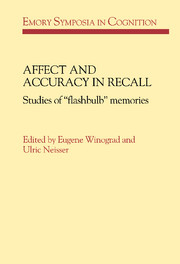Book contents
- Frontmatter
- Contents
- Preface
- List of contributors
- 1 Introduction
- Part I Empirical studies
- Part II Developmental studies
- Part III Emotion and memory
- Part IV Theoretical issues
- 11 Special versus ordinary memory mechanisms in the genesis of flashbulb memories
- 12 Remembering personal circumstances: A functional analysis
- 13 Constraints on memory
- 14 The theoretical and empirical status of the flashbulb memory hypothesis
- Author index
- Subject index
14 - The theoretical and empirical status of the flashbulb memory hypothesis
Published online by Cambridge University Press: 22 March 2010
- Frontmatter
- Contents
- Preface
- List of contributors
- 1 Introduction
- Part I Empirical studies
- Part II Developmental studies
- Part III Emotion and memory
- Part IV Theoretical issues
- 11 Special versus ordinary memory mechanisms in the genesis of flashbulb memories
- 12 Remembering personal circumstances: A functional analysis
- 13 Constraints on memory
- 14 The theoretical and empirical status of the flashbulb memory hypothesis
- Author index
- Subject index
Summary
The purpose of this chapter is to analyze the concept of “flashbulb” memory and contrast it with other forms of human memory. The construct of flashbulb memory was introduced in a seminal paper by Brown and Kulik (1977) to account for memories of events such as the assassination of John F. Kennedy. Brown and Kulik described flashbulb memories as memories for the circumstances of hearing about a highly surprising and consequential event. These memories were said to be like a photograph, to show very little forgetting, and to be produced by a special purpose biological mechanism. Most recent work on this topic derives from the Brown and Kulik paper, and this chapter will begin with a conceptual analysis of that paper. The analysis will examine, in turn, each of the major theoretical and empirical claims of the original Brown and Kulik paper.
Brown and Kulik – theory
Circumstances (news reception context)
The core phenomenon described by Brown and Kulik (1977) is that certain events give rise to memories that show little forgetting. These flashbulb memories include both the central event and the circumstances in which one learned of the event.
Mental imagery
It appears to me that Brown and Kulik believe that the recollection of flashbulb memories involves the occurrence of visual images. Brown and Kulik do not state this explicitly, but it is the only interpretation I can give to their statement that flashbulb memories have a “primary, ‘live’ quality that is almost perceptual” (p. 74).
- Type
- Chapter
- Information
- Affect and Accuracy in RecallStudies of 'Flashbulb' Memories, pp. 274 - 306Publisher: Cambridge University PressPrint publication year: 1992
- 20
- Cited by

